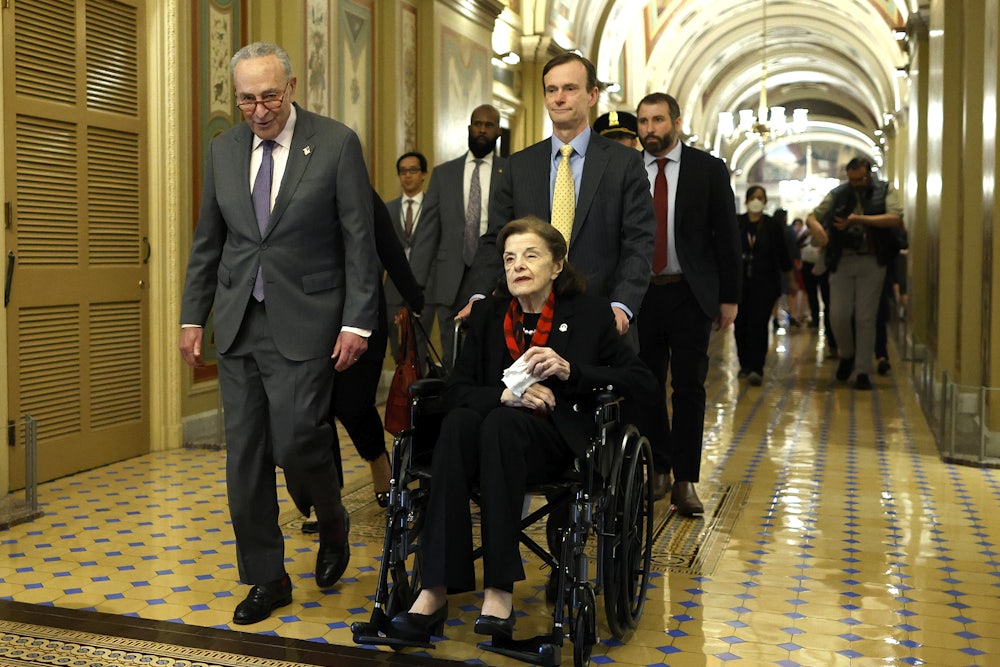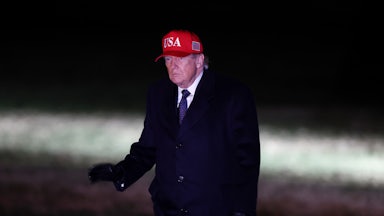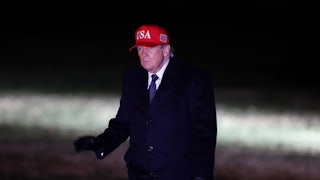The Capitol press stakeout grew in the midday sun outside the Senate’s east entrance on Wednesday. Four cameramen. Five photojournalists. Producers from the major broadcast networks, plus a handful from the print dailies.
We stood there doing what Capitol Hill journalists spend a lot of time doing: waiting. And waiting. Still no sign of Dianne Feinstein. The senior senator from California was due to return to work on Tuesday but never turned up to afternoon votes. She has been absent from the Capitol since February recovering from shingles in San Francisco, where, for many years, although not so much lately, she was a political icon.
Then Feinstein, 89, began to slip, like when I asked her last June to comment for a profile I was writing of California’s junior senator, Alex Padilla, formerly an intern in Feinstein’s office. “Can I go think? Because I can’t remember,” she replied. “Let me talk to some people, and we’ll call you. I’m sorry.” Feinstein’s office never called.
Another time, I asked Feinstein a question about immigration. She stared at me blankly for several long, agonizing seconds until the aide escorting the senator to the vote spoke up. “I think what she’s trying to say is—” Feinstein cut him off, inviting me to join her “for a fine glass of California wine.” I accepted, of course; but again, the aide never reached out.
Feinstein’s aides have since been jumping ship, including her former chief of staff David Grannis, the last engaged, reliable conduit of the senator’s schedule to the press. Since Grannis left Feinstein’s office in March, her remaining aides have been unable to get her to the Senate floor to vote.
“We’ve heard from her team that she’s in D.C.,” a Senate leadership aide told The New Republic on Wednesday. “I don’t think we need her today,” said another. “Tomorrow’s [Senate Judiciary Committee] markup is a different story.”
Voting is the essential function of lawmakers on Capitol Hill. Committee votes move bills to floor votes. Wednesday’s votes in the Senate were scheduled for 11:30 a.m. “If she’s in a wheelchair, they could’ve carted her up through the tunnels,” speculated a veteran photojournalist standing in the sun outside the Senate, hoping to capture Feinstein’s return. “Then again, maybe she’s been inside in her hideaway this whole time. We just don’t know.”
By noon on Wednesday, it was clear that Feinstein wasn’t the only senator running late. At 12:06, Kyrsten Sinema pulled up to the Senate entrance. Josh Hawley rolled through two minutes later. Then Jeff Merkley strolled by. Then Mazie Hirono. Still no sign of Feinstein.
It’s not unusual for senators to run late, especially to the day’s first vote. Sometimes lawmakers skip votes altogether, though this is rare. Politicians failing to show up to votes makes for easy attack ads at election time—easy, though not necessarily effective. Marco Rubio has one of the worst voting records in the Senate, but he still gets reelected in Florida.
Feinstein’s most recent reelection in California is a head-scratcher back east. Some constituents are quick to point out that the choice was between Feinstein and Kevin de León, then a California state senator whom Feinstein beat by nine points after the state’s Democratic establishment closed ranks around her in 2018. At 51, de León would have been a spring chicken by Senate standards. He was a rising progressive star until getting caught last year making racist comments on a hot mic.
Twenty-six minutes after noon, freshman Senator J.D. Vance jogged up the Senate steps to vote, a signal to the press standing by that the vote would soon close. Feinstein didn’t show. Neither did Kirsten Gillibrand or Tommy Tuberville. GOP Senators Susan Collins, Mitt Romney, and Lisa Murkowski joined Democrats to invoke cloture on President Biden’s nomination of Glenna Laureen Wright-Gallo to the Department of Education.
Just after 3 p.m., the news broke: Feinstein was back in the Capitol. Somewhere, Senate Judiciary Chairman Dick Durbin is smiling: Seven judicial nominees and three bills await markup on Thursday in his committee, which, without Feinstein, is evenly split between Democrats and Republicans.
The stakes couldn’t be bigger. If Feinstein shows up and votes with her Democratic majority as expected, Biden’s record spree of judicial confirmations can continue in earnest. If not, Durbin will need GOP support to fill judicial vacancies, one of the few areas Democrats have been able to put major points on the board in a divided Congress (the Senate doesn’t need the House to confirm judges, per the Constitution). In a post-Dobbs world, and with a federal bench stuffed with Federalist Society acolytes, Democrats need to get as many people elevated to the federal bench as they can, as fast as they can.
Why, then, did Senate Democrats put Feinstein on the Judiciary Committee—especially given her obvious decline during the last Congress? “She insisted,” sighed a Senate aide involved in Democrats’ judicial confirmation strategy, adding that Feinstein had been slated to lead the committee until Schumer intervened.
The calls for Feinstein to resign grow in the House (notably, Representatives Ro Khanna and Alexandria Ocasio-Cortez have been beating the resignation drum). This sounds alluring. But Senate Democrats note that GOP senators are unlikely to allow her seat to be filled on the Judiciary Committee.
Last month, Schumer tried to temporarily replace Feinstein, a move Minority Leader Mitch McConnell swiftly blocked. “The far left wants the full Senate to move a Senator off a committee so they can ram through a small sliver of their nominees who are especially extreme or unqualified,” said McConnell at the time. “Senate Republicans will not take part in sidelining a temporarily absent colleague off a committee just so Democrats can force through their very worst nominees.”
Senators can be replaced on committees by unanimous consent, meaning if Feinstein dies or continues to be incapacitated, Republicans can filibuster her replacement on the committee. Anyone who doubts McConnell’s resolve when it comes to pulling out all the stops to block Democrats’ judicial confirmations hasn’t been paying attention.
Feinstein has announced that she will not seek reelection next year; but for the next 19 months, the California senator’s health will dramatically undermine Biden’s agenda on Capitol Hill, in particular his ability to get appointees through. (Joe Manchin has already signaled that he’s going to block many such appointees as he seeks reelection in Trumpy West Virginia.) Sadly, there’s no sign that party leadership is taking the hint. But hey, Senator—I’d still love to grab that glass of California wine.






